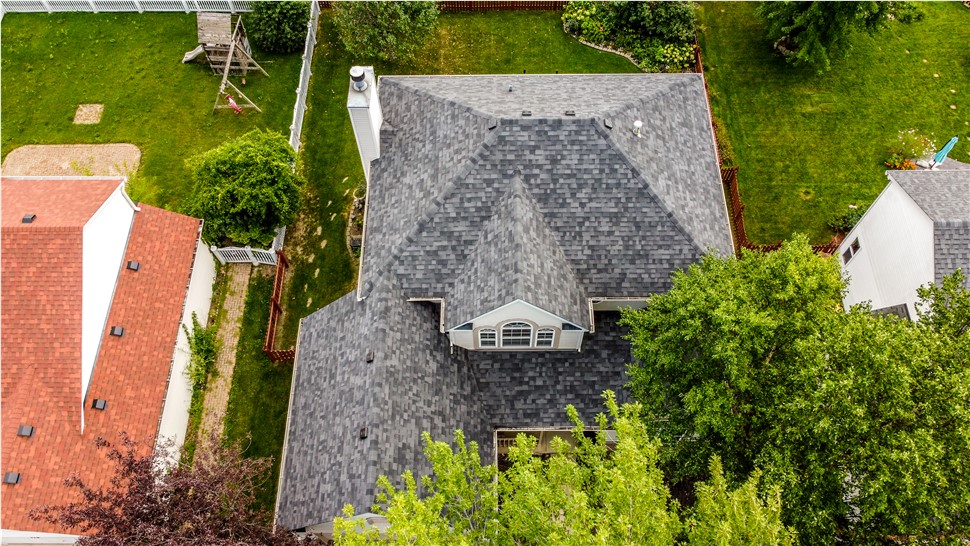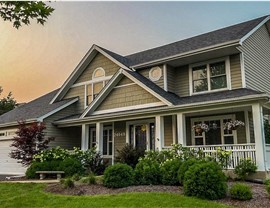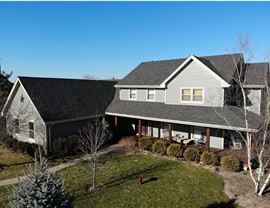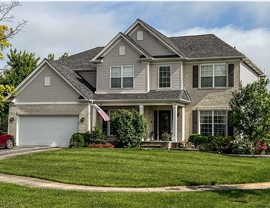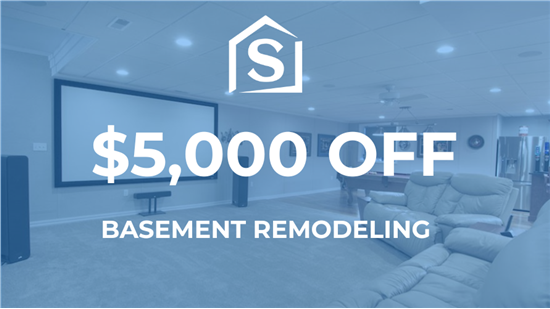Roofing FAQs
Depending on the material, the lifespan of a roof can span from 20-50 years or more. If your roof consists of asphalt shingles, then you should replace it every 20-30 years. Metal roofing can last over 50 years! Durability and lifespan are two very important features of a roof. They are dependent on the quality of materials used, proper installation, and proper and regular maintenance.
Typical signs that indicate you need a new roof are missing or damaged shingles, leaks in the roof, an abundance of granule loss, and curling shingles. If you notice any of these signs, it may be time for you to replace your roof. Reach out to professionals to receive an inspection.
There are many factors that go into determining the cost of a new roof. These factors include the size of the roof, the materials used, labor costs, and more. Receiving an estimate from a contractor will help gauge roughly how much a roof installation will cost.
When choosing a roofing contractor, the company you choose needs to be licensed, insured, and have a good reputation. To determine a company’s reputation, check for Google reviews. Experience, expertise, and products a company uses are other factors to consider. Reputable companies should be able to give free estimates for your potential new roof.
The timeframe for the roof installation can vary depending on various factors, such as size and complexity of the project, weather conditions, and availability of both materials and labor. Roof installations typically last a few days to a couple of weeks. When speaking with the contractor, make sure to go over the approximate timeline for your project.
We will inspect your home to determine the best methods, materials, warranties, and prices for your individual building.
We can install a roof year ‘round, with only minor adjustments due to severe weather conditions.
Yes, but the preferred method is removal. Removal allows for inspection of the substrate, and the elimination of any wet, rough, and/or unstable existing materials.
Basic shingle types are:
- 3-tab shingle – Least expensive shingle on the market
Has a single layer minimum coverage. Good for customers primarily concerned with price. - Dimensional / Architectural Shingle (lifetime)
Has a double layer minimum coverage. Higher quality shingle composed of two layers of material per shingle. - Designer
Beautiful, stylish, and exceptionally durable, Designer lifetime shingles will make your home the envy of the neighborhood!
Dark shingles should last as long as lighter shingles given that they are installed on a house that has a properly vented attic. Proper attic ventilation is the key component to a longer lasting roof.
All debris is taken to a landfill and disposed of properly.
The ridge is the top of your roof, which runs level to the ground (does not have slope). The ridge is usually covered with ridge caps (short shingles laid in a straight line) or, preferably, with a ridge vent.
A valley is created when two main roof decks intersect each other. The resulting junction resembles a valley.
General Questions
Cleanliness is very important. Yes, we clean our work area and the surrounding yard area at the conclusion of every workday.
Material warranties are usually issued by the manufacturers for periods of 5 years to Lifetime (50 years). Stan's Roofing & Siding installs roofing materials from CertainTeed, offering the industry’s best roofing warranties.
No, we provide free estimates for roofing projects in and around the Southwest Suburbs of Chicago.
Basement FAQs
Basement finishing involves turning an unfinished basement (exposed framing, concrete floors) into a livable space with walls, flooring, insulation, lighting, and more. Basement remodeling, on the other hand, refers to updating or changing an already finished basement—like redesigning a layout, upgrading materials, or converting it into a new purpose (e.g., home theater, gym, guest suite).
Yes, in most cases, you'll need a permit. City of Chicago: Requires permits for almost all structural, plumbing, and electrical work. Suburbs (e.g., Naperville, Evanston, Oak Park): Each municipality has its own codes. Most require permits for framing, insulation, electrical, and plumbing. Always check with your local building department before starting
Costs vary based on size, design, and features. As of 2025:
- Basement finishing typically ranges from $40 to $100 per square foot.
- A full remodel with high-end finishes can run $50,000–$120,000 .
Factors affecting cost:
- Moisture issues or waterproofing needs
- Existing ceiling height and layout
- Plumbing/electrical relocation
- Custom features like bars, bathrooms, or media rooms
Yes, finishing your basement can boost your home’s resale value and appeal to buyers, especially in neighborhoods where square footage is at a premium. Expect to recoup 60%–75% of your investment, and more if it includes a legal bedroom or bathroom.
Yes, but only if the space meets egress requirements. You must have a window or door that leads directly outside in case of emergency. In Chicago, a legal bedroom window must have at least 5.7 sq. ft. of opening area and be no more than 44 inches off the floor.
Basements in the Chicagoland area are prone to moisture and water intrusion, especially during spring thaw and heavy rain. Before finishing, we will:
- Inspect for cracks, seepage, or mold
- Install a sump pump (with backup battery)
- Consider drain tile systems or waterproofing solutions
- Use moisture-resistant drywall (e.g., green board) and vinyl or tile flooring
Yes, but it may require an ejector pump if the basement is below the main sewer line. Adding a full or half bath can significantly increase usability and value. Make sure plumbing is installed to code and inspected properly.
There are plenty of ways to elevate your basement, adding comfort and value to your home. Some top trends include:
- In-law suites or guest rooms
- Home theaters or media rooms
- Home gyms
- Work-from-home offices
- Basement bars or wine cellars
- Playrooms or teen lounges
- Rental units (where zoning allows)
Contact Stan's Roofing & Siding Unlimited Basements to get a personalized estimate on your basement remodel.
For an average 1,000 sq. ft. space, finishing takes about 6–10 weeks. Remodeling timelines vary based on complexity but generally take 4–8 weeks. Permit approval times can vary by suburb - Chicago may take longer
Yes. Insulation helps with energy efficiency, moisture control, and soundproofing. Use closed-cell spray foam or rigid foam board to meet Chicago energy codes and help with dampness.
